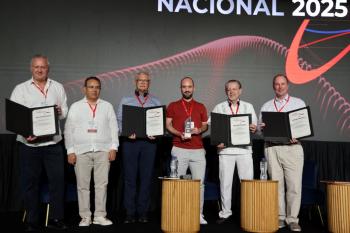Industry priorities for the upcoming revision of the Mexico-United States-Canada Agreement and the exploitation of drivers were key topics during IRU’s panel at the 2025 CANACAR National Convention.
Hundreds of motor carriers, authorities and opinion leaders from across Mexico and North America came together for CANACAR’s 2025 National Convention in Cancun. They discussed ideas and strategies that will help define the future of Mexico’s road freight sector – the engine powering the country’s economy.
IRU’s North American Transportation Forum (NATF) panel delved into the operational and regulatory challenges facing cross-border trucking: from trade negotiations and tariffs to driver visas.
Manuel Sotelo, IRU member CANACAR’s Vice President for the Northern Region, kicked off the panel. He presented the key areas governments must address in the upcoming revision of the Mexico-United States-Canada Agreement (also known as CUSMA and USMCA, hereafter referred to as the Agreement). Rules of origin, increasing border security, tariffs and labour standards are key aspects of the US government’s revision priorities.
“Given trucking’s major role in the Agreement, the industry must work together,” said Manuel Sotelo. “Initiatives pursued by Mexican and US negotiators should not reduce cargo volumes or impede our ability to perform the critical services that importers and exporters depend on.”
“Additional regulatory requirements already require motor carriers to invest more in modern fleet equipment and driver training, such as for English language proficiency,” he added.
Manuel Sotelo highlighted that nearshoring remains an excellent opportunity for boosting foreign investment in Mexico. “The trade Agreement has made such investment attractive. The continuation of the Agreement is paramount to ensure future growth in cross-border trade flows.”
Greg Arndt, Jade Transport’s Co-President and IRU member the Canadian Trucking Alliance’s (CTA’s) Chairman, explained how the Agreement provided a sense of certainty and clear rules. But due to US tariffs, it is no longer the case.
“The Agreement should continue to act as clear ‘rules of the road’,” said Greg Arndt. “The revision should enable carriers to perform transit moves in the US, which have basically ceased with the introduction of ACE [an electronic document that carriers submit to US Customs and Border Protection].”
“Cross-border documentation should be further digitalised, including by establishing a regional, integrated single window system and single joint inspections when needed. This could also help eliminate customs penalties for minor or clerical errors,” he added. Tax issues and the threat of a US legal system with “nuclear verdicts” are other key concerns that CTA would like to see addressed in the upcoming revision.
Ed Gilroy, Chief Advocacy and Public Affairs Officer at IRU member the American Trucking Associations (ATA), recognised the challenges impacting cross-border trucking. The threat and use of tariffs undermine the certainty needed for international trade.
Motor carriers have faced pressure to increase operations ahead of tariff deadlines, only to see those deadlines repeatedly extended. Operational uncertainty prevents carriers from planning appropriately.
“The US has tried to provide some level of relief for goods complying with rules of origin requirements,” said Ed Gilroy. “But they are still concerned about Agreement partners being potentially used as a back door. Eliminating this back-door process is a key US government priority.”
“As the main transport mode for trade under the Agreement, it is essential that carriers have the necessary systems and processes to make cross-border movements as efficient and secure as possible. This is why ATA supported the original Agreement negotiated during the first Trump administration,” he added.
ATA is concerned about the impact of tariffs on consumers and carriers alike. It continues to support mechanisms that boost and protect legitimate trade while also seeking further harmonisation to improve safety and security.
“Safety is paramount to ATA,” said Ed Gilroy. “This is why we support the administration’s enforcement of English proficiency regulations. Recent highway incidents have demonstrated the need to boost enforcement in a uniform and sensible manner.”
“We will continue to monitor this issue closely and work with the Department of Transportation, state law enforcement, and our industry partners in Canada and Mexico,” he added.

Driver exploitation
The panellists expressed concern about drivers, especially recent immigrants in Canada and Mexico, including those with B-1 visas, being used illegally in cabotage operations.
CTA is seeking stronger enforcement by both Canadian and US authorities at the state, provincial and federal levels to prevent carriers from conducting illegal and unsafe practices.
“Greater enforcement resources and initiatives are needed to stop bad carriers from taking advantage of new, inexperienced drivers in illegal operations,” said Greg Arndt.
“This has resulted in unfair competition for carriers abiding by regulatory requirements as well as inexperienced, untrained and unsafe drivers working on our shared roads. Such illegal operations must be stopped,” he added.

ATA is working to address the multiple concerns related to B-1 drivers used by unscrupulous carriers to perform cabotage in the US, sometimes for weeks at a time.
“We are working with both the Department of Transportation and the Department of Homeland Security to increase enforcement actions against carriers conducting cabotage,” said Ed Gilroy.
The issue of B-1 drivers is also a major concern for Mexican carriers.
“The illegal use of drivers in the US means they are not working for Mexican carriers. This requires carriers to find, train and license additional drivers to cover the workload of drivers staying in the US,” said Manuel Sotelo. “This is very costly.”
All three NATF members agree that resolving the illegal exploitation of foreign drivers is a win-win-win solution.
In partnership with IRU members ATA (US), CANACAR (Mexico) and CTA (Canada), NATF brings together industry leaders to address key challenges and opportunities across North America.
